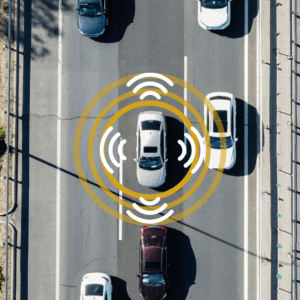Your car is a computer on wheels!
Actually, several computers on wheels. Even the most basic cars these days have at least 30 ECU’s (Electronic Control Units), and luxury models can have many more.
Computers started being used in vehicles as a means of monitoring the effectiveness of emission control systems, back in the 1970’s. Vehicle manufacturer’s agreed (with some government encouragement) to standardize codes and computer operation. In 1996, standards were set so that all car manufacturers were required to use a specific system.
What used to be controlled mechanically is now a system of wires and sensors that feed information into your car’s main computer, Electrical Control Units (ECU). This is your car’s “brain” which manages devices, sensors and actions that occur throughout your vehicle.
The ECU is like your car’s “brain”, taking in information like engine temperature, air density, power demand, etc. ECU’s also send out messages that can control or change how the engine or various systems operate. ECU’s process important information from the engine, all the way to electronic locking systems, lights, climate control, seat position, etc.
When a Check Engine Light appears on your dash, diagnostic codes can be read from the main computer with a code reader. We will read these codes as a courtesy for our
 |
| Code Reader |
customers. The codes allow us to determine if the problem requires you to stop driving your car immediately before damage (or more damage) can occur. These codes will provide us a clue to the problem, but it takes an educated and experienced technician to be a detective and to determine what part or system then needs to be addressed.
For example, you may get a check engine light as your first warning. The “code” may indicate a fault at the oxygen sensor. Now the detective work begins. Some vehicles can have up to 6 oxygen sensors. Or the code could point to a problem with the Mass Airflow Sensor ($500 repair), whereas further
 |
| Dr. John – Technician |
inspection and diagnostic time could show simple breakdown and cracking in the air inlet hose ($150-200). Further diagnostics can actually save you money in the long run.
Common engine sensors (like the “nerves” of our body sense heat, pain, or pressure) include:
- MAP Sensor: Manifold Absolute Pressure Sensor, which is a vacuum gauge. Symptoms: Poor running (idling), stalling.
- Mass Airflow Sensor: Measures air entering the engine and adjusts the fuel/air mixture. Symptoms: Poor running, stalling.
- Temperature Sensor(s): Since temperature is critical to your vehicle’s operation and increased heat can cause severe damage, there are several temperature sensors. Of particular importance is the coolant/engine block temperature sensor. Problems will present as rich or lean mixture, black smoke (rich).
- Crankshaft/Camshaft Position Sensor: On engines for computer controlled timing, this sensor tells the computer which cylinder should be firing. Symptoms: no start, hesitation, misfires.
- Oxygen Sensor: Used to fine tune the fuel/air mixture (input) and measure exhaust gases both before and after the catalytic convertor (monitors emission standards). Symptoms: poor fuel economy and Check Engine Light on.
Other sensors that are not critical to the running of your engine will give feedback on the door locking system, climate control system, seat position, sound, seat belts, air bags etc. When any of these systems are not working correctly, they will be annoying but may not be critical to your vehicle operation. Any issue in these systems can be repaired by finding and correcting the exact problem.
Computers have made our vehicles more responsive and sophisticated, and automated – to a point. Even with our advanced technology, our cars still require the basics for safe and reliable operation: regular maintenance – oil, as well as other fluids and lubrication- and replacement of parts that wear with time and mileage.At Honest Accurate Auto, we can sort through the complex technology of today’s vehicles, any American or Japanese make and model. Let us make it easy for you!




